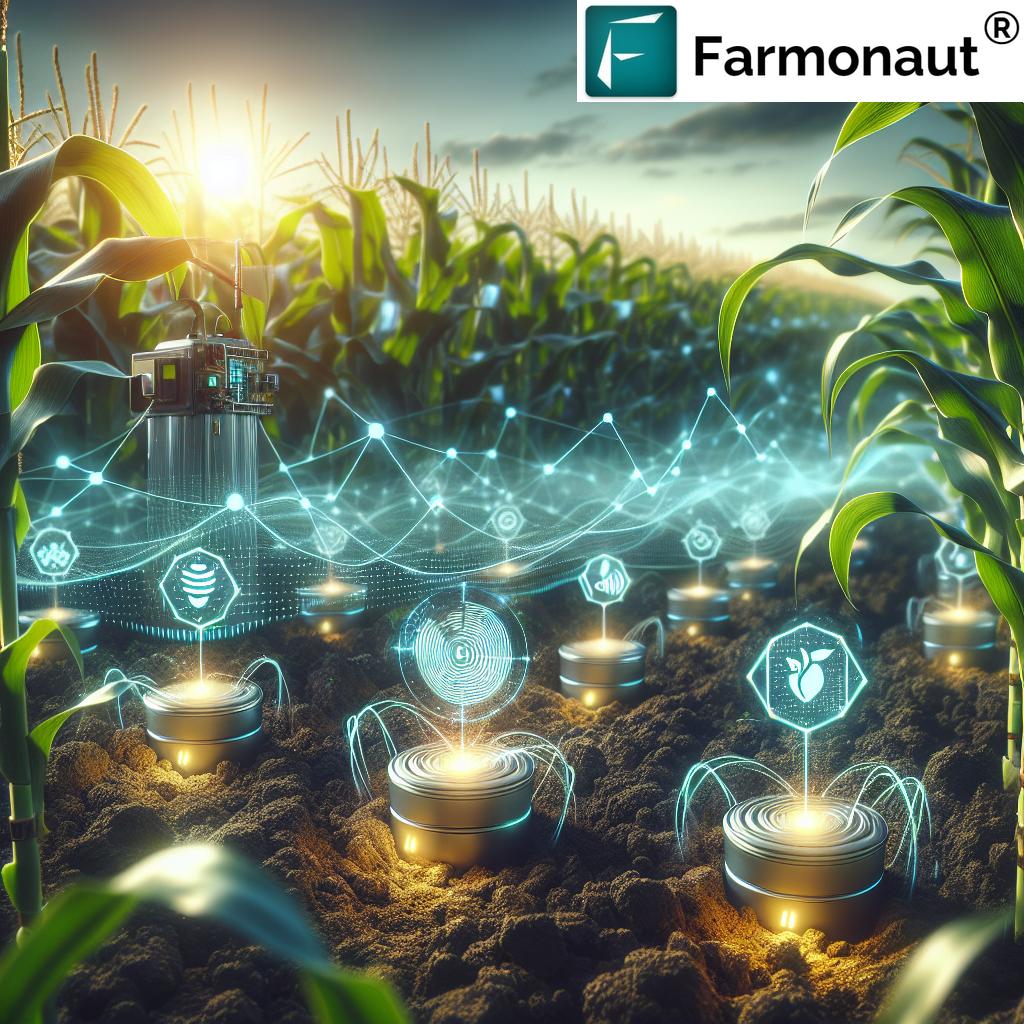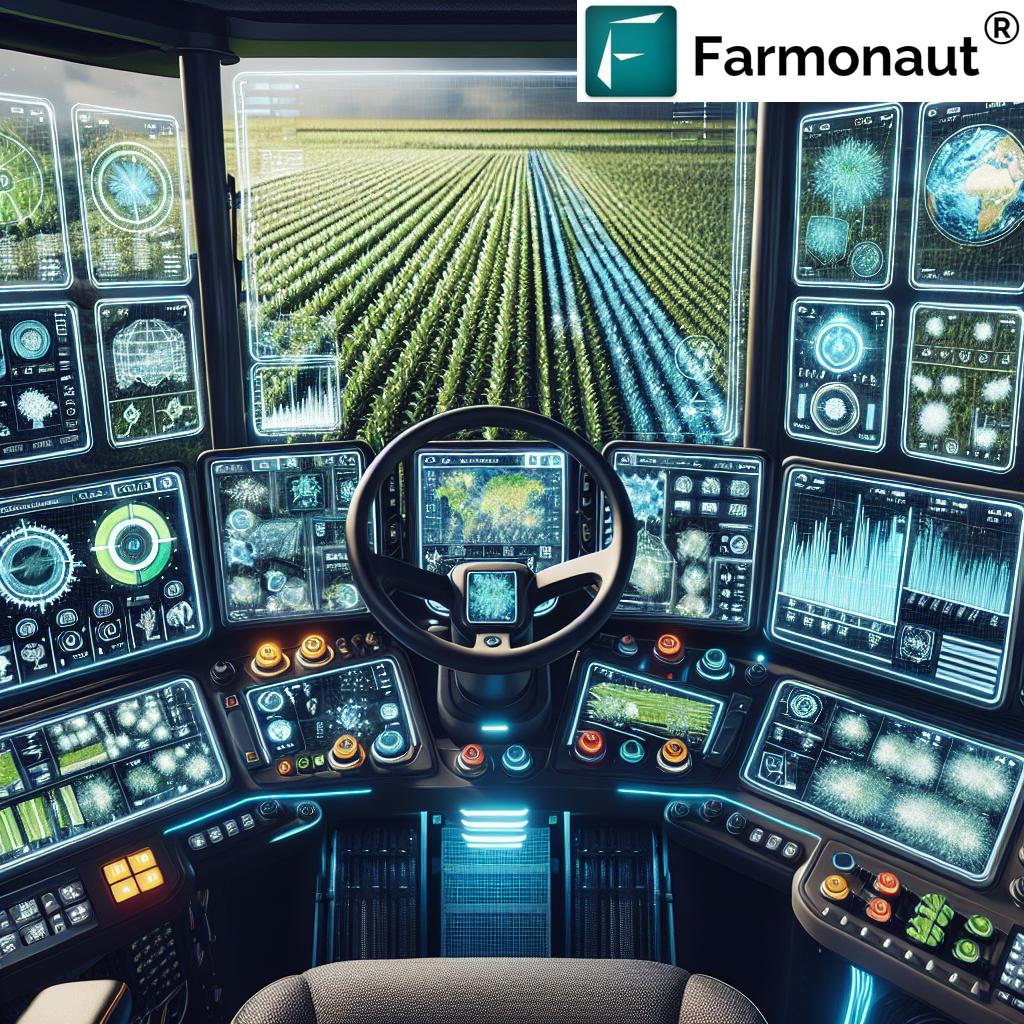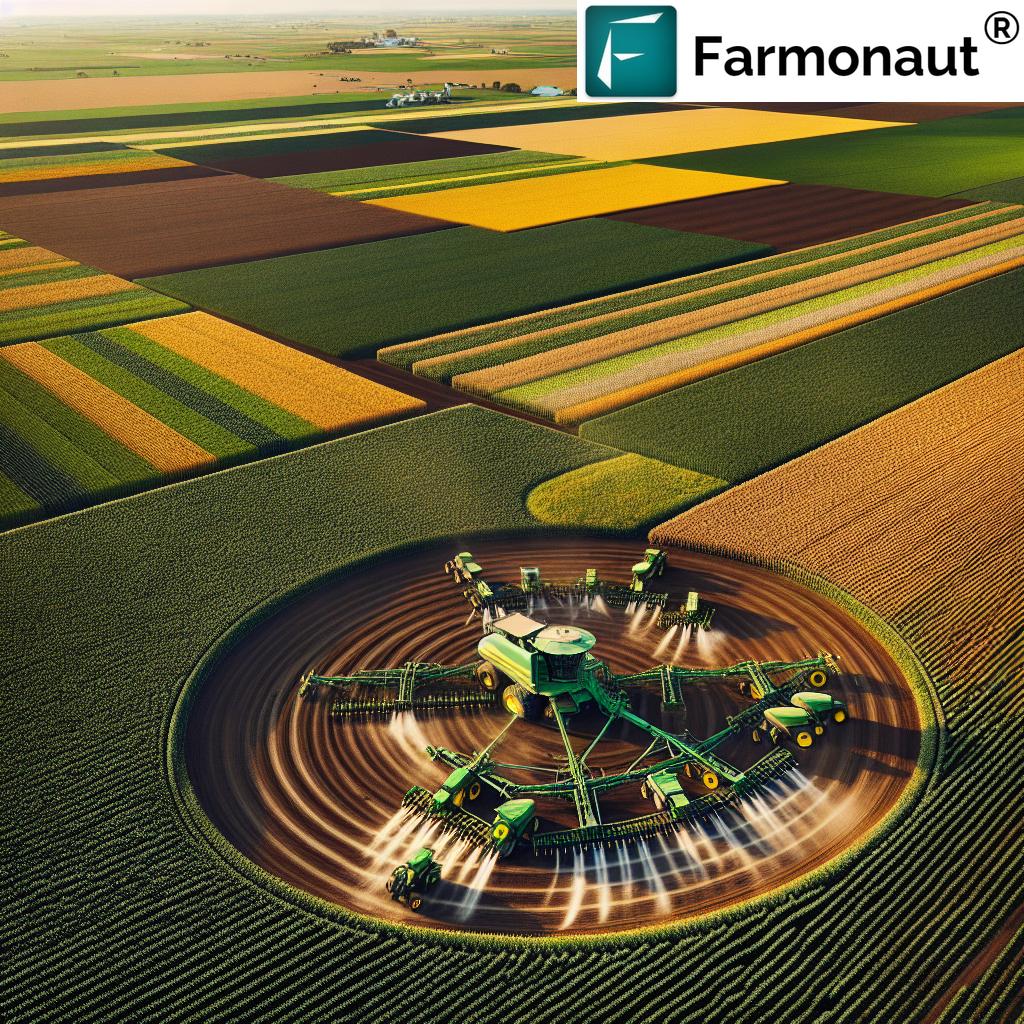Revolutionizing Western Illinois Farming: How Precision Agriculture Technology Boosts Crop Health and Yield

In the heartland of America, nestled along the banks of the mighty Mississippi River, Western Illinois has long been a cornerstone of agricultural production in the United States. As we step into a new era of farming, the integration of precision agriculture technology is revolutionizing the way we cultivate our fields, manage our crops, and optimize our yields. This transformative approach is not just changing the face of agriculture in our region; it’s setting a new standard for farming practices across the nation.
At Farmonaut, we’re at the forefront of this agricultural revolution, providing cutting-edge smart farming solutions that empower farmers to make data-driven decisions and maximize their productivity. Our satellite-based farm management platform is designed to make precision agriculture affordable and accessible to farmers of all scales, integrating advanced technology with traditional farming wisdom.
The Landscape of Western Illinois Agriculture
Before we dive into the technological advancements reshaping our farmlands, let’s take a moment to appreciate the unique agricultural landscape of Western Illinois. Our region is characterized by its fertile soils, favorable climate, and strategic location along the Mississippi River, making it an ideal environment for growing a variety of crops, particularly corn and soy.
- Rich, loamy soils perfect for crop cultivation
- Moderate climate with adequate rainfall
- Proximity to major waterways for transportation
- Strong tradition of farming and agricultural innovation
However, like many agricultural regions, Western Illinois faces challenges such as unpredictable weather patterns, soil erosion, and the need for sustainable resource management. These challenges have spurred the adoption of precision agriculture technology, transforming how we approach farming in the 21st century.
The Rise of Precision Agriculture in Western Illinois
Precision agriculture, also known as precision farming, is an approach that uses data, technology, and smart farming solutions to optimize agricultural practices. In Western Illinois, we’ve seen a significant uptick in the adoption of these technologies, driven by the need to increase efficiency, reduce costs, and improve sustainability.
Key Components of Precision Agriculture
- GPS-guided machinery: Tractors, planters, and harvesters equipped with GPS technology for precise navigation and operation
- Remote sensing: Satellite and drone imagery for crop health monitoring and field mapping
- Variable rate technology: Systems for variable rate fertilizer application and seeding based on field conditions
- IoT sensors: Agricultural IoT sensors for real-time monitoring of soil moisture, temperature, and other critical factors
- Farm management software: Digital agriculture tools for data analysis and decision-making
These technologies work together to create a more efficient, productive, and sustainable farming ecosystem. Let’s explore how each of these components is making a difference in Western Illinois agriculture.
GPS-Guided Machinery: Precision in Motion

One of the most visible changes in Western Illinois farms is the widespread adoption of GPS-guided machinery. These advanced machines are revolutionizing the way we plant, tend, and harvest our crops.
Benefits of GPS-Guided Farm Equipment
- Improved accuracy: Reduces overlap and gaps in planting and spraying
- Increased efficiency: Allows for operation in low visibility conditions, extending working hours
- Reduced operator fatigue: Automated steering systems ease the physical strain on farmers
- Better resource management: Precise application of seeds, fertilizers, and pesticides
In Western Illinois, we’ve seen farmers embrace GPS-guided tractors, planters, sprayers, and combines with enthusiasm. These machines are not just about convenience; they’re about precision and efficiency that translate directly into improved yields and reduced costs.
Integrated Farm Machinery: The Power of Connectivity
Modern farm equipment isn’t just about individual machines; it’s about creating an integrated system where all components work together seamlessly. This level of connectivity is transforming Western Illinois farms into highly efficient operations.
- Data sharing between machines for coordinated operations
- Real-time adjustments based on field conditions
- Compatibility across different brands and models
- Integration with farm management software for comprehensive oversight
At Farmonaut, we understand the importance of farm equipment compatibility. Our platform is designed to integrate seamlessly with a wide range of agricultural machinery, ensuring that farmers can make the most of their technology investments.
Remote Sensing: Eyes in the Sky for Crop Health
Remote sensing technology, particularly satellite imagery, has become an indispensable tool for Western Illinois farmers. This technology allows us to monitor crop health and field conditions with unprecedented accuracy and frequency.
Satellite-Based Crop Monitoring
Farmonaut’s satellite-based crop health monitoring system provides farmers with valuable insights into their fields’ conditions. Here’s how it works:
- Regular imagery capture: Satellites capture multispectral images of fields at frequent intervals
- Data analysis: Advanced algorithms process the imagery to extract meaningful information
- Vegetation index calculation: NDVI (Normalized Difference Vegetation Index) and other indices are computed to assess crop vigor
- Anomaly detection: The system identifies areas of concern, such as potential pest infestations or irrigation issues
- Actionable insights: Farmers receive easy-to-understand reports and recommendations
This technology enables Western Illinois farmers to detect and address issues early, potentially saving entire crops from devastating losses.
Benefits of Remote Sensing in Agriculture
- Early detection of crop stress and disease
- Optimization of irrigation and fertilizer application
- Improved yield forecasting
- Time and cost savings through targeted field scouting
- Historical data for long-term field management
By leveraging remote sensing technology, Western Illinois farmers are gaining a competitive edge in crop management and yield optimization.
Variable Rate Technology: Precision in Application
Variable rate technology (VRT) is another game-changer in Western Illinois agriculture. This technology allows for the precise application of inputs such as fertilizers, seeds, and pesticides based on the specific needs of different areas within a field.
How Variable Rate Technology Works
- Field mapping: Detailed maps are created using soil samples, yield data, and satellite imagery
- Prescription creation: Based on the maps, prescriptions for input application are developed
- Equipment configuration: VRT-enabled machinery is programmed with the prescriptions
- Automated application: As the equipment moves through the field, it automatically adjusts application rates
This level of precision ensures that every part of the field receives exactly what it needs, no more and no less.
Benefits of Variable Rate Technology
- Improved resource efficiency: Reduces waste of expensive inputs
- Enhanced crop yield: Optimizes growing conditions across the entire field
- Environmental benefits: Minimizes over-application of chemicals
- Cost savings: Reduces overall input costs while improving yields
Farmonaut’s platform integrates seamlessly with VRT systems, providing the data and analysis needed to create accurate prescriptions for variable rate fertilizer application and other input management strategies.
IoT Sensors: Real-Time Field Intelligence

The Internet of Things (IoT) has made its way to Western Illinois farms, with agricultural IoT sensors providing real-time data on various field conditions. These sensors are transforming how we monitor and manage our crops.
Types of Agricultural IoT Sensors
- Soil moisture sensors: Monitor water content in the soil
- Weather stations: Provide localized climate data
- Crop sensors: Measure plant health and growth
- Equipment sensors: Track machinery performance and maintenance needs
These sensors work together to create a comprehensive picture of field conditions, allowing farmers to make informed decisions quickly.
Applications of IoT in Western Illinois Agriculture
- Precision irrigation: Optimize water use based on real-time soil moisture data
- Pest and disease detection: Early warning systems for potential outbreaks
- Harvest timing: Determine optimal harvest times based on crop maturity data
- Equipment management: Predictive maintenance to prevent breakdowns during critical periods
By integrating IoT sensor data with our satellite-based monitoring system, Farmonaut provides Western Illinois farmers with a comprehensive view of their operations, enabling more precise and timely decision-making.
Farm Management Software: The Digital Command Center
At the heart of precision agriculture in Western Illinois is sophisticated farm management software. These digital agriculture tools serve as the central hub for data collection, analysis, and decision-making.
Key Features of Modern Farm Management Software
- Data integration: Combines information from various sources (sensors, machinery, satellites)
- Visualization tools: Creates easy-to-understand maps and charts
- Analysis algorithms: Processes data to generate actionable insights
- Record keeping: Maintains detailed logs of all farm activities
- Planning tools: Assists in creating crop plans and resource allocation strategies
Farmonaut’s platform exemplifies the power of modern farm management software, offering a user-friendly interface that puts the power of big data analytics in the hands of Western Illinois farmers.
Benefits of Digital Farm Management
- Improved decision-making: Data-driven insights lead to better farming choices
- Increased efficiency: Streamlines farm operations and reduces manual record-keeping
- Better resource allocation: Optimizes the use of inputs based on historical and real-time data
- Enhanced traceability: Maintains detailed records for regulatory compliance and market requirements
- Long-term planning: Facilitates strategic decision-making for future seasons
By adopting comprehensive farm management software, Western Illinois farmers are positioning themselves at the forefront of agricultural innovation.
The Impact of Precision Agriculture on Western Illinois Farming
The adoption of precision agriculture technology has had a profound impact on farming practices in Western Illinois. Let’s examine some of the key areas where we’ve seen significant improvements:
Crop Yield Optimization
One of the most notable benefits of precision agriculture is the optimization of crop yields. By leveraging data-driven insights and precise application of inputs, Western Illinois farmers have seen substantial increases in productivity.
- Increased yields: Many farmers report 10-15% increases in crop yields after implementing precision agriculture techniques
- Consistency: Reduced variability in yields across fields and seasons
- Quality improvements: Better crop quality due to optimized growing conditions
Resource Efficiency
Precision agriculture has led to significant improvements in resource utilization, benefiting both the environment and farmers’ bottom lines.
- Water conservation: Precision irrigation systems have reduced water usage by up to 30% in some cases
- Fertilizer optimization: Variable rate application has cut fertilizer use by 15-20% while maintaining or improving yields
- Fuel savings: GPS-guided machinery and optimized field operations have reduced fuel consumption by 10-15%
Environmental Sustainability
The adoption of precision agriculture techniques has also contributed to more sustainable farming practices in Western Illinois.
- Reduced chemical runoff: Precise application of pesticides and fertilizers minimizes environmental impact
- Soil health improvements: Data-driven crop rotation and tillage practices enhance long-term soil fertility
- Carbon footprint reduction: Increased efficiency in machinery use and input application lowers overall emissions
Economic Benefits
The economic impact of precision agriculture on Western Illinois farms has been substantial.
- Cost savings: Reduced input costs through optimized application of seeds, fertilizers, and pesticides
- Increased profitability: Higher yields and better crop quality lead to improved market prices
- Risk mitigation: Early detection of crop issues reduces the risk of significant losses
Challenges and Considerations in Adopting Precision Agriculture
While the benefits of precision agriculture are clear, Western Illinois farmers face several challenges in implementing these technologies:
Initial Investment Costs
- High upfront costs for equipment and software
- Potential need for farm-wide infrastructure upgrades
Technical Expertise
- Learning curve associated with new technologies
- Need for ongoing training and support
Data Management and Privacy
- Concerns about data ownership and security
- Complexity of managing and interpreting large datasets
Integration with Existing Systems
- Ensuring compatibility between new and legacy equipment
- Seamless integration of various software platforms
At Farmonaut, we’re committed to addressing these challenges by providing affordable, user-friendly solutions that integrate seamlessly with existing farm operations. Our platform is designed to make the transition to precision agriculture as smooth and cost-effective as possible for Western Illinois farmers.
The Future of Precision Agriculture in Western Illinois

As we look to the future, the role of precision agriculture in Western Illinois is set to expand even further. Here are some trends and developments we’re excited about:
Artificial Intelligence and Machine Learning
- Advanced predictive analytics for crop management
- Automated decision-making systems for real-time farm operations
Robotics and Automation
- Autonomous tractors and harvesters for 24/7 operation
- Precision weeding and harvesting robots
Advanced Sensor Technology
- More sophisticated and affordable IoT sensors
- Integration of blockchain for enhanced data security and traceability
Climate-Smart Agriculture
- Integration of climate data for long-term resilience planning
- Advanced modeling for climate change adaptation strategies
As these technologies evolve, Farmonaut remains committed to staying at the forefront of agricultural innovation, ensuring that Western Illinois farmers have access to the most advanced and effective precision agriculture tools available.
Precision Agriculture Technology Comparison
| Technology Type | Traditional Method | Farmonaut Satellite System | Benefits |
|---|---|---|---|
| Crop Health Monitoring | Manual field scouting | Satellite-based NDVI analysis | Early detection of issues, comprehensive coverage, time-saving |
| Irrigation Management | Fixed schedule or visual assessment | Soil moisture analysis from satellite data | Water conservation, optimized crop growth, reduced costs |
| Pest/Disease Detection | Regular field inspections | AI-powered anomaly detection in satellite imagery | Early intervention, targeted treatment, reduced crop loss |
| Yield Optimization | Historical data and experience | Data-driven insights from multi-year satellite analysis | Increased yields, optimized input use, improved profitability |
Frequently Asked Questions
Q: How does precision agriculture benefit small farms in Western Illinois?
A: Precision agriculture technologies, like those offered by Farmonaut, can be scaled to benefit farms of all sizes. Small farms can see significant improvements in efficiency, reduced input costs, and increased yields, even with limited initial investment.
Q: Is precision agriculture environmentally friendly?
A: Yes, precision agriculture contributes to environmental sustainability by optimizing resource use, reducing chemical runoff, and promoting soil health through data-driven practices.
Q: How difficult is it to implement precision agriculture technologies?
A: While there is a learning curve, many precision agriculture tools, including Farmonaut’s platform, are designed to be user-friendly. We offer support and training to help farmers transition smoothly.
Q: Can precision agriculture help with climate change adaptation?
A: Absolutely. Precision agriculture provides the data and tools needed to adapt to changing climate conditions, helping farmers make informed decisions about crop selection, planting times, and resource management.
Q: What kind of return on investment can farmers expect from precision agriculture?
A: While results vary, many farmers see a positive ROI within 2-3 growing seasons through increased yields, reduced input costs, and improved efficiency.
Embracing the Future of Farming in Western Illinois
As we’ve explored throughout this article, precision agriculture technology is revolutionizing farming in Western Illinois. From GPS-guided machinery to satellite-based crop monitoring, these innovations are helping our farmers increase yields, reduce costs, and farm more sustainably.
At Farmonaut, we’re proud to be part of this agricultural revolution. Our satellite-based farm management platform is designed to make precision agriculture accessible and affordable for farmers of all scales. By providing real-time insights into crop health, soil conditions, and weather patterns, we’re empowering Western Illinois farmers to make data-driven decisions that optimize their operations.
We invite you to join us in embracing the future of farming. Whether you’re looking to dip your toes into precision agriculture or you’re ready to take your smart farming practices to the next level, Farmonaut has the tools and expertise to support your journey.
Ready to revolutionize your farming practices? Check out our subscription options below and take the first step towards a more productive, efficient, and sustainable future for your farm.
For more information about our services and to explore how Farmonaut can benefit your farm, visit our website or download our mobile app:
Developers interested in integrating our satellite and weather data into their own systems can explore our API documentation:
Together, we can cultivate a brighter, more sustainable future for agriculture in Western Illinois and beyond. Join us in harnessing the power of precision agriculture to boost crop health, optimize yields, and ensure the long-term success of our farming communities.